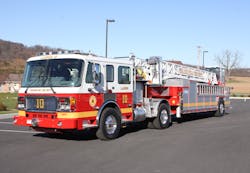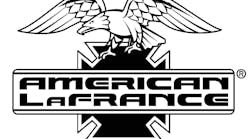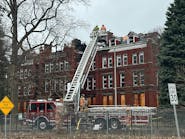It appears the legendary truck builder American LaFrance has died – again.
Rumors, speculations and scorn is circulating among fire apparatus manufacturers. Some are angry, saying when a company like American LaFrance (ALF) goes out of business, it gives all the truck builders a black eye making everyone leery of the integrity the fire service.
Others are sad to see the legendary name go out, for a second time. And still others are wondering what is going to happen to the people who had trucks on order and the vendors who had extended credit to them, even though the company had previously declared bankruptcy in 2008 and shed a lot of debt to stay afloat.
A lot of apparatus manufacturers are in Orlando, Fla., this week for the 26th annual Fire Department Safety Officers Association's annual apparatus symposium. Some of them were willing to talk about the news that American LaFrance closed its doors indefinitely on Jan. 17. Some didn’t want to go on the record and some had comments that couldn’t be printed anyway, at least not in a “family” publication.
Most were concerned about the fire departments who may have contracted with the company for apparatus which may never be delivered. There’s a rumor that one nameless department put down $375,000 for a new apparatus just days before the doors closed.
And then there’s the fact that Philadelphia, a long-time ALF customer, is still due two more tractor-drawn tiller aerials from an order placed over two years ago. It has received only one.
Some vendors represented here in Florida are concerned about components and items given to ALF on credit and whether they’ll see any money from the orders.
For Neal Brooks, the national apparatus sales manager for W.S. Darley & Sons, news that ALF closed its doors was not surprising.
“It’s not at all surprising,” Brooks said. “Could see it coming.” Brooks said one of the big reasons ALF got into trouble is because it was being run by people who didn’t know the fire service. “You’ve got to have experience in the fire service if you want to succeed."
Indeed management of American LaFrance under its current owners, New York-based, Patriarch Partners LLC, the company that most recently was running it anyway, once said they could run garbage truck cabs and chassis down the same line as fire trucks because they were essentially the same thing. Those comments were quoted far and wide and showed how out of touch management was with the fire service.
Anyway, Tim Dean, president of Pro-Poly, a tank and body builder based in Florida, who is a partner with Darley in apparatus, said he was sorry to see the name go out, again.
“It’s unfortunate that American LaFrance has closed, but it’s understandable,” said Dean, who is a past president of the Fire Apparatus Manufacturers’’ Association (FAMA). He added that in this economy, it is difficult for some businesses to have profitability and sustain operations. “You just hate to see it happen though.”
He’s also sorry for any vendor or department who may have been stiffed in the deal.
“Let’s hope they do the right thing,” Dean said.
Another apparatus manufacturer, who asked not to be quoted or identified, said the demise of American LaFrance hurts everyone in the business because it damages the trust between the manufacturers and the customers.
“It gives everyone a black eye,” said the veteran fire truck business who has been building and selling apparatus for decades. “The trust is just gone.”
He predicted that all manufacturers will be forced to have performance bonds.
As an aside, performance bonds for apparatus are still a good idea. Just ask the fire departments who were stiffed about $1 million when New Lexington Fire Equipment, based in Rockwood, Pa., closed its doors for good 2006. And I bet there are a number of American LaFrance departments who wish they had performance bonds.
But, back to the veteran’s thoughts on ALF.
He said he believes American LaFrance was using other department’s money to keep the company afloat. By offering discounts for cash, or partial or full payments, he felt ALF keep the doors open longer than they probably could have otherwise.
“They were using other people’s money by offering discounts,” he said, noting that departments shouldn’t let manufacturers use their money to underwrite operations.
Another representative of an unnamed truck builder said he would have to take some time to come up with a publishable quote. Hours later he said he still didn’t have anything to say for publication. He did say he was sorry for departments and vendors who might be hurt, financially, but the closer of the company.
American LaFrance has closed at least once before and perhaps twice if you count the 2008 bankruptcy.
American LaFrance is one of the oldest and most storied names in fire trucks. It started in 1873, but the company has roots that go back even further to 1832 with processor companies that built horse-drawn apparatus.
In the early 1990s, American LaFrance sort of petered out and ceased operations until it was bought in 1995 by Freightliner which at the time was headed by a man named Jim Hebe. Freightliner, which was owned by Daimler Chrysler, put truck veteran Hebe in charge Freightliner. Ironically, Hebe had started his truck career at American LaFrance in 1972.
In 1997, Freightliner, under direction of Hebe, opened a brand-new apparatus building plant in Cleveland, N.C., just outside of Charlotte. I’ve been there, it’s impressive, with a fire station looking façade.
Hebe was so bent on resurrecting American LaFrance, he bought 3-D Manufacturing in Wisconsin, Aerial Innovations in Pennsylvania, and Becker Fire Equipment in Wyoming and a substantial interest in R.D. Murray in New York.
Hebe’s game plan was to build American LaFrance cabs and chassis in North Carolina and “sell” them to body manufacturers owned by the parent company, Freightliner. The idea was to put a squeeze on the other custom cab and chassis manufacturers and, effectively change the way apparatus was built in the country.
It didn’t work.
In 2005, investment firm Patriarch Partners took ownership of American LaFrance, taking over from Freightliner. At the helm of the investment firm is Lynn Tilton, a flamboyant entrepreneur. After opening a new facility in Summerville, S.C., in 2007, American LaFrance filed for bankruptcy in January 2008 citing $100 million in debt.
It seems then company never fully recovered from that bankruptcy and the proof is in the pudding with the closing of the company last week.
Dean, the president of ProPoly and PolyBilt, said he thinks someone might resurrect the name yet again.
I wouldn’t place any bets on it, however. It will be very difficult to dig out of this one.
But, some people say the third try is always the charm. Still, don’t hold your breath.








